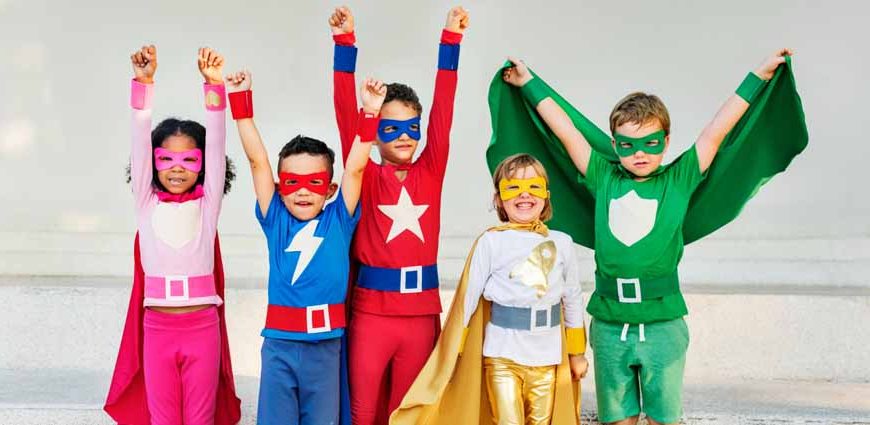As parents, have you ever wondered, “Are superheroes good role models for my child?”
Picture this: your kids are huddled together on the couch, snacking on homemade treats, eyes glued to the screen as their favourite superhero swoops in to save the day. It’s heartwarming to see their excitement and admiration for these larger-than-life characters. But as much as you love seeing them enjoy these moments, it’s important to consider the impact superheroes can have on their growing minds.
Superheroes can inspire creativity, bravery, and a sense of justice in children. However, they can also promote unrealistic expectations, reinforce stereotypes, or glorify violence if not approached critically. This article delves into both sides of the story, analyzing 14 ways superheroes positively and negatively influence kids.
Positive Effects of Superheroes on Kids
Let us first look at some of the positive effects of superheroes on kids:
- Superheroes for kids can inspire creativity and imagination
- Superheroes for children act as role models
- Superheroes for Kids teach teamwork
- Superheroes for children can encourage empathy and compassion
- Superheroes for children can promote social skills
- Can lead to an interest in science and technology
- Superheroes educate about courage and willpower
Superheroes have an amazing ability to influence children’s ingenuity and fantasy. Kids can create their unique superhero personas, abilities, and outfits by envisioning themselves as superheroes, urging them to think outside the box and come up with innovative solutions to problems. Superheroes for kids are an engaging and powerful instrument for personal growth.
Children idolise their favourite superheroes and often emulate their behaviour and decision-making abilities. Therefore, to acquire good qualities, children must have a decent role model to look up to. Superheroes can be excellent role models for children because they teach them qualities like bravery, honesty, modesty, battling spirit, a sense of duty, and leadership. There cannot be a better example than Superman. Despite being the world’s most powerful man, he decides to be an ordinary human being and serve others by being an upright journalist.
Why do you think movies like Avengers, Justice League and X-Men are superhits and are fan favourites? It is because all the superheroes come together and work as a team to fight against evil and help people. While working towards a shared objective, all team members appreciate each other’s views and abilities.
Some superheroes feel a tremendous need to assist those in need. Superman and Spiderman are two superb examples of this. They always protect the needy and innocent.
Exposure to this superhero quality will teach children the value of compassion and motivate them to assist those in need.
Children who like superheroes will probably want to chat about their favourite characters with their pals or pretend to be superheroes themselves. This can help promote social skills and encourage children to work together and share ideas.
Superheroes often have incredible abilities or use advanced technology to fight crime. Children may be motivated by this to pursue careers in science and technology and study more about these subjects. Iron Man is super enthusiastic about science and technology. That is how he inspires young people to pursue careers in STEM fields and to become innovators and problem-solvers.
Even though the odds are stacked against them, superheroes never give up until they achieve their objective. For instance, Captain America frequently demonstrates incredible courage and willpower in the Marvel Cinematic Universe. Captain America urges the other Avengers to keep fighting despite being outnumbered and outgunned. This bravery and tenacity exemplify the value of fortitude and willpower in the face of difficulty for audiences of all ages. Superheroes for kids promote social skills
Children who are fans of superheroes frequently want to discuss their favourite shows, books, or comics with others, which can spark interactions and relationships with their classmates. Children may also improve their social skills by learning how to work with others, share ideas, and take turns by playing superhero games or acting out superhero situations with pals.
Negative Effects of Superheroes on Kids
Now that you know the positive effects of superheroes on kids, let’s look at the negative effects of superheroes on kids.
- Can promote violence and aggression
- Can lead to unrealistic expectations of heroism
- Can promote unrealistic body expectations
- May put the children at risk of injuries
- Can reinforce gender stereotypes
Superheroes for kids can become detrimental, particularly when they advocate violence and crime on television. Some superheroes, like Batman, Wolverine and Deadpool, use violence to fight crime. This can encourage violence and hostility in youngsters. Therefore, parents should keep an eye on their children’s exposure to violent content.
Some kids’ superheroes can set unrealistic expectations, encouraging your little ones to emulate the actions of their superheroes. Parents must teach their children that heroism can take various forms and that even tiny acts of compassion and bravery may make a difference.
Many superheroes have idealised physiques that can promote unrealistic body expectations in children, especially boys. Can lead to obsession or addiction
Children who grow excessively obsessed with superheroes may dedicate too much time to viewing movies or reading comic books, which can lead to addiction and disregard for other important elements of life.
Children may imitate the superhero’s moves, such as jumping from high things, doing acrobatic feats, or fighting with their peers, resulting in significant injuries.
Many superheroes are male, and this can reinforce gender stereotypes and limit girls’ interest in superheroes. There are, however, many female superheroes who may serve as great role models for females.
Conclusion
Superheroes can have both positive and negative effects on children. While superheroes can inspire creativity, promote physical activity, and foster a sense of heroism, they can also promote violence and aggression, reinforce gender stereotypes, and promote unrealistic body expectations. Therefore, parents must supervise their children’s exposure to superheroes and educate them to understand the possible good and negative consequences of worshipping their heroes blindly. It is also worth noting that there are many child or kid superheroes who are specifically designed for younger audiences. These characters often have more age-appropriate storylines and are less violent than their adult counterparts. Child superheroes like Billy Batson, Hiro Hamada, Kamala Khan can be positive role models for children and encourage them to develop their own heroic qualities. If you are planning a movie night with your little one, check out our blog, Best 10 Disney Stories For Kids Of All Time, for the best recommendations.
For information on things related to your little one’s development, growth, health and nutrition, follow EuroKids Blogs, and do check out our nationally recognized preschools – EuroKids for the first step in your kid’s educational journey!
















